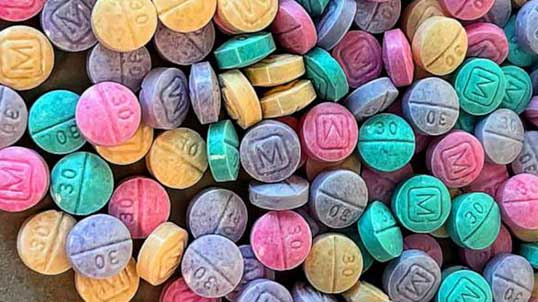Rainbow Fentanyl | Dangerous Drug Trend Hits Ohio Youth

Medically Reviewed By: Manish Mishra, MBBS
Fentanyl is widely considered the most dangerous drug in Ohio. In 2022, drug dealers started selling a brightly colored version of fentanyl called rainbow fentanyl. This substance, which is sold primarily to young people, poses a high risk of deadly overdose.

Fentanyl is a synthetic opioid that’s considered the deadliest drug in the United States. According to the Centers for Disease Control and Prevention (CDC), it’s up to 50 times stronger than heroin. In 2020, it contributed to 81% of drug overdose deaths in Ohio.
Recently, drug cartels have started selling a colorful version of fentanyl called rainbow fentanyl. Here’s what you should know about this dangerous new drug.
What Is Rainbow Fentanyl?
Rainbow fentanyl is a brightly colored drug that comes in various forms, including pills, powders, and blocks that look like sidewalk chalk. Each form is available in multiple colors.
According to officials at the U.S. Drug Enforcement Administration (DEA), drug traffickers created rainbow fentanyl to attract young Americans to a highly addictive drug. In other words, the drug’s bright appearance is meant to turn young people into repeat fentanyl customers.
If you come across brightly colored fentanyl pills, powders, or blocks (or any other type of fentanyl), don’t touch them. Instead, contact law enforcement immediately.
Risks Of Rainbow Fentanyl
Rainbow fentanyl pills, powders, and blocks pose a high risk of overdose and addiction.
Overdose
According to the DEA, just two milligrams of fentanyl(equal to about 10 grains of salt) can cause a deadly overdose.
The most common symptoms of a fentanyl overdose include:
- slowed or stopped breathing
- slowed or stopped heartbeat
- nausea and vomiting
- limpness
- cold, pale, or clammy skin
- bluish lips and/or fingernails
- loss of consciousness
If you or someone you know experiences these symptoms, call 911 right away. Also, administer naloxone if you have it. Naloxone (brand name Narcan) is a medication that can rapidly reverse the effects of an opioid overdose. You can get it at most pharmacies without a prescription.
Addiction
Fentanyl addiction is a serious disease that makes you feel unable to stop using fentanyl even if you want to. The most common symptoms are tolerance and physical dependence.
Tolerance means that over time, your body gets used to the effects of fentanyl. You will then need increasingly larger or more frequent doses to achieve the desired high.
Physical dependence means your body becomes unable to function normally without fentanyl. If you stop using it, you may experience withdrawal symptoms such as anxiety, sweating and muscle aches.
Other symptoms of fentanyl addiction and opioid use disorder may include:
- mood swings
- loss of interest in activities once enjoyed
- loss of motivation
- difficulty keeping up with responsibilities
- decline in personal hygiene
- isolation
Like other types of addiction, fentanyl addiction requires professional treatment.
Fentanyl Addiction Treatment Options
People with fentanyl addiction should seek help at substance abuse treatment programs. Some of these programs are inpatient, while others are outpatient.
At an inpatient program, you live at a treatment facility and receive 24/7 care. At an outpatient program, you live at home while regularly visiting a treatment facility.
In most cases, inpatient programs are recommended for people with moderate-to-severe addictions, while outpatient programs can work for people with milder addictions and supportive homes.
Both inpatient and outpatient programs offer treatment services such as:
- medical detox, in which doctors help you slowly and safely stop using fentanyl with minimal withdrawal symptoms
- mental health counseling, in which a therapist helps you manage fentanyl cravings and any mental health concerns that may have led you to abuse drugs in the first place
- medication-assisted treatment (MAT), in which doctors prescribe medications to ease fentanyl cravings and withdrawal symptoms
- support groups, in which you can share your experiences with other people recovering from fentanyl addiction
How To Protect Young People From Rainbow Fentanyl
As a parent or caregiver, you should warn your children about the risks of rainbow fentanyl.
Make sure they know how dangerous it is to buy illegal drugs, and demonstrate responsible behavior by using drugs only as prescribed by your doctor. Also, keep an eye on your child’s online activity. Fentanyl and other drugs are often sold on social media.
If you suspect your child is using rainbow fentanyl or another drug, talk to them. Try to remain calm, as an emotional outburst may prevent your child from opening up.
Discuss what led your child to try drugs. While some kids just want to experiment, others use drugs to self-medicate mental health conditions. In that case, you should help your child find appropriate treatment.
You should also contact your child’s health care provider, who can screen your child for addiction.
If you or someone you love struggles with illicit or prescription drug abuse, please reach out to Ohio Recovery Center. Our comprehensive, inpatient treatment programs offer a variety of evidence-based services to help you or your loved one stay drug-free.
- Centers for Disease Control and Prevention — Fentanyl Facts https://www.cdc.gov/stopoverdose/fentanyl/index.html
- Drug Enforcement Administration — DEA Warns of Brightly-Colored Fentanyl Used to Target Young Americans https://www.dea.gov/press-releases/2022/08/30/dea-warns-brightly-colored-fentanyl-used-target-young-americans
- National Library of Medicine: MedlinePlus — Opiate and opioid withdrawal https://medlineplus.gov/ency/article/000949.htm
- Ohio Department of Health — Drug Overdose https://odh.ohio.gov/know-our-programs/violence-injury-prevention-program/drug-overdose/
- Substance Abuse and Mental Health Services Administration — Opioid Overdose https://www.samhsa.gov/medication-assisted-treatment/medications-counseling-related-conditions/opioid-overdose

